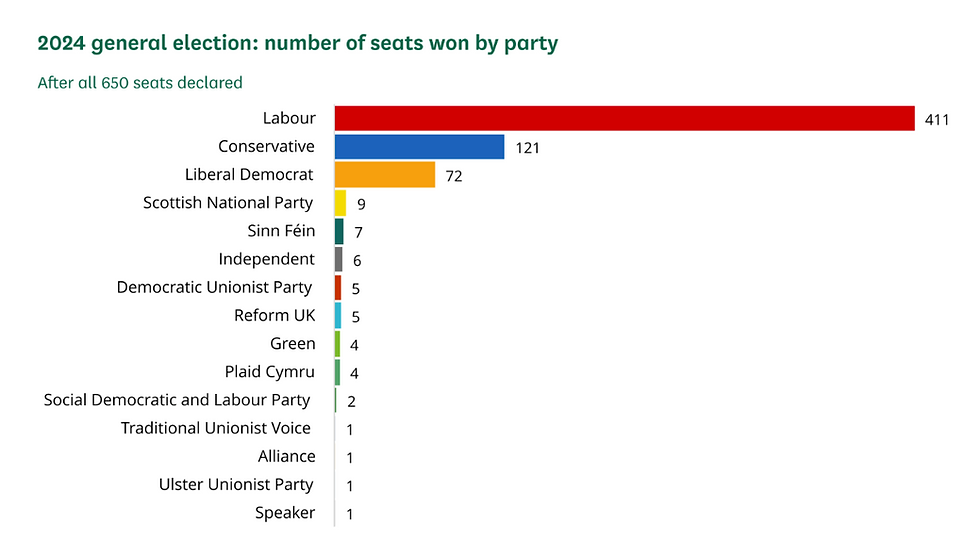The Racial Investment Gap
- david42834
- Sep 21, 2021
- 3 min read

A look at pretty much any dataset relating to wealth outcomes in the UK reveals a similar theme: people from ethnic minority backgrounds hold less wealth, are lower paid, and have higher rates of employment than their White British counterparts. This theme is even more pronounced when you look at the black community in particular.
The Runnymede Trust’s ‘Colour of Money’ report published in April 2020 showed that for every £1 of wealth held by White Britons, Black Caribbean Brits had 20p and Black African Brits had 10p. This is compared to 95p and 50p of wealth for Indian and Pakistani households respectively.
According to the Office for National Statistics’ ethnicitiy pay gap figures, in 2018 white workers were paid 3.8% more than all other ethnic groups, a figure which jumps to 21.7% in London, 44% of whose population is made up of ethnic minorities.
Lastly, when it comes to work, pay and benefits, data on GOV.UK shows that Black people have a 9% unemployment rate, compared to 7% for all other ethnic groups, and 4% of White people.
Even more telling is than an internet search containing the keywords ‘racial investment gap’ do not produce any search results for ethnic minorities in the UK, instead revealing stories about the racial investment gap in the US, albeit accompanied by a narrative that is unlikely to surprise anybody.
There are a few things working against the community. The events of 2020 have shown us quite plainly the discrimination and systemic challenges faced by the black community. Time in the country impacts us too. With a majority of the non-UK born Black African and Caribbean community arriving in the country within the last century, we haven’t lived in this country long enough to take advantage of the tax and monetary systems to the extent that other communities have.
You don’t really need a government dataset to conclude that if a community has less wealth, is lower paid and is under-employed, this is going to impact their ability to generate wealth, much less build it and pass it on. It is however a positive that we have a starting point to work from.
The playbook for wealth building is as true for individuals as it is communities. For the black community to be able to build wealth, and close the racial investment gap the first step must be a solid grounding in financial education.
Rightly or wrongly, we live in a highly competitive consumer economy, and so the default ‘financial education’ for most of us will have been on how to spend money and take out debt. To learn about more productive uses of money such as saving and investing, we must read books, listen to podcasts, attend events and workshops and share our learnings with each other. There are far too many examples to list here, but an internet search for ‘UK personal finance books/podcasts/events’ is a great starting point.
Next, we must look to pensions, the largest source of wealth in the country (making up 42% of the UK’s £14.6 trillion total net wealth).
As a community we must make sure that we pay into our pensions and take advantage of the generous tax breaks given to pension savers by the government, and the workplace contributions we are legally entitled to as employees. People who work from themselves are most at risk of not participating in pension wealth, with 31% of self-employed people not paying into one, but this can easily be circumvented by opening a private pension with one of many providers.
Lastly worth exploring is the growing library of content being created by the many talented financial content creators on social media. Instagram, YouTube and other social media platforms are full of finance content creators, many of which are from Black Carribean and African backgrounds, creating content to suit every taste.
In conclusion we must be willing to take a long term view. The fruits of our efforts are unlikely to be felt fully by us, but by future generations. This is how compounding works. Famed investor Warren Buffett is quoted as saying that: “Someone is sitting in the shade today because someone planted a tree a long time ago”.
If the labours of other communities have been able to bear fruit for today’s generations, then for the black community it is not simply a case of ‘if’, but ‘when’.
Timi is the founder of Mr MoneyJar, a financial education platform for people in the UK. Mr MoneyJar offers accessible, practical guidance around personal finance and investing through digital content, workshops, events and 121 coaching.
External links
You can book a 121 session with Timi by contacting him via his Instagram page, at instagram.com/mrmoneyjar
When investing, the value of your investment may rise or fall and there are no guarantees you will get back all the capital you have invested.
(vii) www.money.co.uk/pensions




Comments